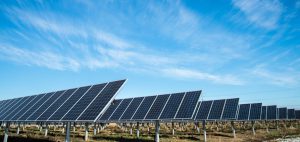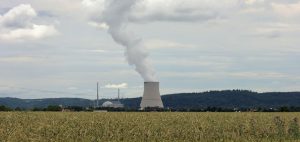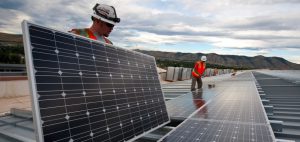Bioenergy

Pineapple cultivation in northern Australia (Ananas comosus)
Biomass production
Bioenergy crops with efficient photosynthesis and water-use, enhanced crop yields in suboptimal environments, and adaptation to arid conditions; growth of aquatic plants in semi-sealed systems.
Biomass conversion
Biogas production from crop waste by improved Anaerobic Digestion, on- and off-grid use of gas, water and ethanol separation, combustion performance of aqueous ethanol/gasoline mixes, catalysts for the production of methane and hydrogen.
Ecological and social impact
Identifying high-priority conservation targets, visualization of trade-offs, carbon footprints of biofuel supply chains, infrastructure requirements, impact on food security and land use.
This work is based in Plant Sciences*, Engineering, Zoology, Chemistry, and the Transport Studies Unit**.
*Supported by the Oxford Martin School, **Part of the School of Geography and the Environment
Demand and efficiency

More efficient axial electric motors, are being commercialised by spin-out YASA Motors
Technologies
Compact motors and advanced internal combustion design, gas turbines, lightweight airframe and automotive materials, high temperature combustion and energy generation systems, improved catalysts, and smart meters.
Energy use
Social, behavioural, economic, institutional and policy factors; design of cities, efficient buildings, transport modes, demand side flexibility, and community energy.
Policy
Effectiveness of demand side policies, design and assessment of policy instruments, stakeholder engagement, development of innovative policy on fuel poverty, personal carbon trading and energy efficiency.
This work is based in Engineering, Physics, Materials, Chemistry, Computer Science, the Environmental Change Institute*, the Oxford Institute for Energy Studies (OIES is a Recognised Independent Centre of the University of Oxford), the Oxford e-Research Centre, the Mathematical Institute, the Transport Studies Unit*, and the Smith School of Enterprise and the Environment*.
Economics, policy, politics, law and regulation

It is hard to provide consumers with a credible way to distinguish between power from a coal plant with power from a solar farm
Energy policy and market reform
Trade-offs between security of supply, costs and environmental objectives; design of policies, legal and regulatory structures.
Social science of energy system transitions
Political economy of energy, and the economics and policies that might support innovation and accelerate transitions.
Energy resources and the next generation
Discounting and intergenerational justice in the context of energy resources and related natural capital.
Work on energy markets, politics, economics, and policy related to fossil fuels, electricity networks, demand and efficiency, energy storage, transport, energy in developing countries, bioenergy, and nuclear energy is described under these headings.
This work is based in the Smith School of Enterprise and the Environment*, the Environmental Change Institute*, the Oxford Institute for Energy Studies, the Transport Studies Unit*, the Institute for New Economic Thinking at the Oxford Martin School, Politics and International Relations, Law, International Development, and Engineering Science.
Energy networks

Oxford is addressing a wide range of challenges involved in smartening the grid and designing future electricity markets
Infrastructure
Developing and using system simulation models to inform analysis, planning and design of national infrastructure and smarter networks.
Data
Scalable algorithms and technologies for real time analysis of smart grids, development and publishing of datasets.
Forecasting
Modelling, forecasting and control on low voltage networks, response to time of day tariffs and pricing, novel technologies, public attitudes.
Consumer behaviour
Effects of education, information, personal advice and feedback on energy use; balancing automated switching and active consumer engagement in demand response.
Energy Markets
Economics of electricity networks, investment, coordinated planning, wholesale market design and regulation, merit order operation, pricing, and the roles of demand and storage.
This work is based in Engineering, the Oxford Institute for Energy Studies, the Environmental Change Institute*, the Mathematical Institute, the Oxford e-Research Centre, and the Transport Studies Unit*.
Emerging economies

Oxford scientists are working to develop bioenergy crops suitable for hot arid conditions
Analysis (technical, economic, political) of energy supply and demand and related environmental issues, and of the growing importance of developing countries in world energy markets. Provision of advice to governments in Africa, S America, India, China, CIS, and elsewhere. Developing robust, low maintenance, low cost energy technologies for use in rural areas.
This work is based in the Smith School of Enterprise and the Environment*, the Oxford Institute for Energy Studies, International Development, the Environmental Change Institute*, Engineering, Geography, Physics, and Politics and International Relations.
Earth resources

Fossil fuels currently provide nearly 80% of the world’s primary energy
Upstream
Geology of sedimentary basins/shale-gas/oil, structural dynamics and wave-structure interactions, foundations for offshore structures, pipelines, environmental impacts of drilling sites, Local Ecological Footprinting Tool to minimise ecological risks.
Downstream
Reduction of energy consumption and environmental impact in the petroleum industry.
Carbon Capture and Storage: evaluating the suitability of shallow aquifers, leakage of CO2 and detection methods.
Oil and gas markets: oil and gas (conventional, unconventional and LNG) markets and prices, politics and economics of oil and gas rich regions.
This work is based in the Oxford Institute for Energy Studies, Earth Sciences, Engineering, Chemistry, the Mathematical Institute, Politics and International Relations, Geography, and International Development.
Wind and marine

Simulated flow through a 3-bladed tidal turbine with interaction of the helical blade tip vortices with the turbine’s support column
Tidal energy
Axial, cross-flow and novel devices, tidal resource assessment and analysis.
Wave energy
Dynamics and statistics of ocean waves, interaction with wave energy devices, device performance, integration into the energy system.
Offshore structures
Extreme wave loading, load minimization through streamlining support structures, behaviour under monotonic and cyclic loading, novel designs for and monitoring of installed foundations.
Ecological impacts: sea-going multidisciplinary research, mapping and assessment of biodiversity and ecosystem services.
This work is based in Engineering** and Zoology.
Nuclear

Forming a balanced view on the future of nuclear power requires understanding and information on future technologies and their role in policy and governance.
Nuclear fission
Development of irradiation-tolerant materials, generation 4 reactors, safety, sensory networks to monitor stored nuclear waste.
Nuclear fusion
New and improved materials for fusion reactors, plasma behaviour in ‘magnetic confinement’ devices, methods and theory of ‘inertial laser-fusion’.
Nuclear futures
Risks, safety and environmental impact of nuclear energy, international and domestic security, regime implications and ethics.
This work is based in Materials, Chemistry, Physics, and Engineering.
Solar

Solar is the only renewable energy source which could, in principle, easily meet all the world’s energy needs.
Photovoltaics
Improving cSi cells (impurity detection), pioneering work on perovskite based cells, organic and hybrid cells (‘biomimetic’ absorbers, advancing dye-sensitised cell efficiency), novel cell architectures and manufacturing processes (roll-to-roll), advanced PV concepts (multi-junction devices, hot-carriers, multi-exciton generation, quantum dot devices, crystalline thermo-photovolatic cells) metal oxide based PV, improved transparent conducting oxides, first principle calculations and modelling.
Artificial photosynthesis
Robust and scalable catalysis, enzymes for efficient electron capture and high reaction rates.
Concentrated Solar Power: optimisation of multi-mirror configurations for power generation and for cooking in developing countries.
This work is based in Physics**, Materials, Chemistry, Engineering, and the Mathematical Institute**.
Reports
Roadmap on established and emerging photovoltaics for sustainable energy conversion
Storage and vectors

There is an increasing demand to store energy in order to allow it to be used later, when and wherever needed
Electrochemical Storage
New manufacturing approaches for battery and supercapacitor electrodes, low cost materials for grid storage, improved solid state electrolytes, performance modelling and battery health management.
Thermal storage
Phase-change materials for Solar-Stirling generators and solar heating and refrigeration applications, domestic thermal storage for demand side management, smart measurement systems for hot water tanks.
Chemical storage
New routes to sustainable hydrogen and ammonia production, solid state materials for storage, synthesis of hydrocarbons from hydrogen and CO2.
Regulatory and policy challenges
Economic and policy considerations in the design of market structures and pricing signals, modelling the grid integration of storage, intelligent planning for the grid and for market structures.
This work is based in Chemistry, Materials, Engineering, the Mathematical Institute, and the Oxford institute for Energy Studies.
Transport

E-bikes or scooters have become ubiquitous in many cities.
Transport in Cities
Analysis of scenarios designed to reduce energy use, technical and economic modelling of take up of different fuels and technologies assuming different incentives.
Lower carbon transport technologies
Power trains for electric and hydrogen vehicles, biofuels, temperature measurement inside combustion chambers, high temperature materials, control systems for improvement fuel efficiency, high-efficiency low-weight electric motors, energy efficiency of autonomous electric vehicles, improved aero engines.
This work is based in the Transport Studies Unit*,**, Engineering** , Physics and Materials.

